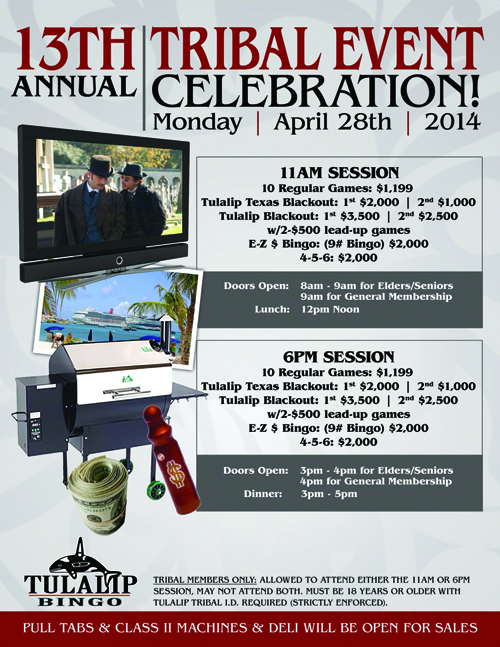Category: Tulalip News
April 2, 2014 syəcəb
Tulalip Hibulb Cultural Center Upcoming Events
Tulalip community to hold Inter-tribal jam session to raise aid for victims of Oso mudslide.

By Brandi N. Montreuil, Tulalip News
TULALIP – On the heels of a large donation made by the Tulalip Tribes to aid victims of the Oso, Washington mudslide, the Tulalip community is organizing additional aid in the form of an Inter-tribal Jam session to raise money for Oso families as they recover from their losses.
Tulalip Tribal member Natosha Gobin, the event’s organizer, explained the proximity of the Oso community to Tulalip created a desire in community members to want to help.
“I had an idea that we could do an inter-tribal jam session where we invite other tribes to our reservation to share songs and prayers while raising money for donations. People have done these in the past, and it has been a positive gathering that uplifts people in a time of heartache. All it took was posting on Facebook to see who would be interested in volunteering for the event, and right away there was enough interest to make it happen.”
The jam session is scheduled for April 4 at 6:00 p.m. at 6700 Totem Beach Road on the Tulalip Reservation. A $5 donation will be accepted at the door and the event will feature a concession stand serving beverages, frybread, spaghetti and hamburger soup as well as baked goods. A raffle with items donated by local tribal artists will also be held during the event.
Proceeds from the event will be given to the victims of the mudslide with portions donated to a variety of local relief groups assisting with the mudslide such as search and rescue crews, fire stations, and animal shelters.
“This is all happening from the community uniting to make it a success. There are volunteers in planning, cooking and baking, as well as manning stations at the event, said Gobin. “This is not just for Tulalip tribal members, this is a community gathering to share in songs and prayers.”
The session will begin with a prayer and Amazing Grace sung by Tulalip artist Cerissa Gobin followed by traditional request for guests who traveled the farthest to sing first.
The donations and support from tribes has been incredible. Many tribes citing personal experience with the tragedy of natural disasters.
“Our prayers and thoughts are with all the families that have been affected by this. One of those that was lost in the landslide was a close friend of mine. This affects everybody, no matter where you are or who you are, as tragedy strikes, we all share together,” said Tulalip Tribes Chairman Mel Sheldon, about the Tulalip Tribes donation.
To date Tulalip donated $100,000 to the Snohomish County Red Cross and $50,000 to the Cascade Valley Hospital Foundation. The Colville Tribe dispatched teams of search and rescue volunteers. Just today, Snoqualmie announced a $275,000 donation to assist.
For more information, or to volunteer at the event, please contact Natosha Gobin at 425-319-4416 or at tagobin@yahoo.com.
Brandi N. Montreuil: 360-913-5402; bmontreuil@tulaliptribes-nsn.gov
The Tulalip Tribes donates $150K to Oso disaster relief efforts
“When tragedy strikes, we all share together.”
By Andrew Gobin, Tulalip News
TULALIP – This morning at 10:00 a.m. the Tulalip Tribes Charitable Contributions Fund donated $100,000 to the American Red Cross and $50,000 to the Cascade Valley Hospital Foundation to aid in disaster relief efforts in the Oso community. On Saturday, March 22, a massive landslide swept over houses, SR530, and even the Stilliguamish River. A concerted relief effort by search and rescue teams, fire crews from around the state, the national guard, and numerous other organizations and individual volunteers continues to clear the road, monitor the river, and search for missing people as families and the Oso community cope with grief.
“We at the Cascade Valley Hospital Foundation are so humbled and deeply grateful. Neighbors helping neighbors, and we will help our mutual neighbors as they recover from this devastating loss,” said Heather Logan, Cascade Valley Hospital Representative for the Cascade Valley Hospital Foundation.
Chuck Morrison of the American Red Cross also expressed gratitude, offering a few encouraging words.
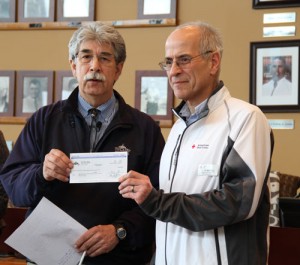
“We share a mission of making sure the families of those missing are all taken care of,” he said. “This generous gift from the Tulalips will help us serve the families of the missing victims of this catastrophic mudslide. We appreciate the
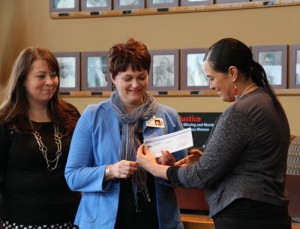
Photo/ Brandi N. Montreuil, Tulalip News
donations from organizations and individuals across the region and the country to help meet the continuing needs.”
He went on to explain what the funds will do for the relief effort, supplying search and rescue teams and volunteers, as well as immediate assistance for victims of the catastrophe.
Logan spoke about what these funds will do long term, being used for assistance for victims, even to help cover funeral costs.
“We will keep it local, and with zero overhead expenses,” she said.
Tulalip Tribes Chairman Mel Sheldon Jr. said, “Our prayers and thoughts are with all the families that have been affected by this. One of those that was lost in the landslide was a close friend of mine. This affects everybody, no matter where you are or who you are, as tragedy strikes, we all share together.”
Historically, the people of Tulalip have suffered similar catastrophic loss. A landslide in the 1820s on the southern point of Camano Island, known as Camano Head, demolished an historic village site killing all of its inhabitants. The slide sent a tidal wave across to the north tip of Hat Island, devastating that village site as well.
Sheldon said, “We remember, through history, how close that comes to us as we think of our friends in Oso. We share our deep condolences with everyone affected by this tragedy, which is heartfelt throughout our community. We hope this donation will aid people as they grieve and work to rebuild their lives.”
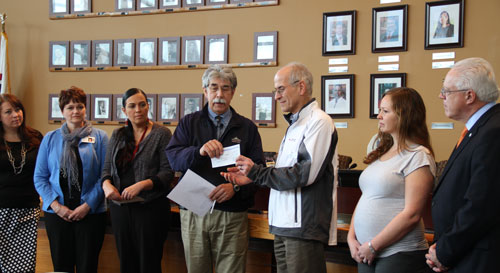
Photo/ Brandi N. Montreuil, Tulalip News
Andrew Gobin is a reporter with the See-Yaht-Sub, a publication of the Tulalip Tribes Communications Department.
Email: agobin@tulaliptribes-nsn.gov
Phone: (360) 716.4188
March 26, 2014 syəcəb
Tulalip man known for helping others needs help

Randy Ervin’s GoFundMe campaign opened to help deal with life changing stroke
By Niki Cleary, Tulalip News
Randy Ervin is a guy who loves life. Ask his many friends who have enjoyed, or lovingly suffered, his bizarrely funny bitstrips and constant Christmas countdowns. He’s also a friend, a mentor, a beloved co-worker and leader. He’s a beacon of hope for those in recovery, and a poster child for living better sober than addicted. Since February 25, Randy has been completely incapacitated after suffering a massive stroke. He is looking at returning to a two-story home and full time caregiving, with no prospects of returning to a normal life anytime soon.
Randy’s wife of 23 years, Tina Ervin, painted the picture.
“I left the house on February 25, I was only gone for about half an hour,” she explained. “I came home and he was sitting in the chair and he was just sitting there. He was non-responsive. I pulled up on his face, and I said, he’s having a stroke.”
Randy was in a medically induced coma for a week and a half. Doctors kept him breathing with a ventilator while they monitored the swelling in his brain. It took another two weeks to slowly bring him out of the coma.
“His right side is paralyzed,” Ervin said, describing her husband’s symptoms. “He’s learning how to speak all over again. He lost the ability to form words when he tries to talk and he’s learning to write with his left hand.
“If you write ‘apple, banana’ and leave an open space, he’s trying to figure out what to put in that open space, but he can’t tell you that the line of words means fruit. His brain is still not firing the way it should. Three hours a day he’s in physical and speech therapy, they’re teaching him how to use the other side of his brain.”
Family and friends aren’t the same for Randy either, many of his memories are missing because of the stroke.
“He didn’t recognize his brother, his best friend,” said Ervin. “Our anniversary is the 23rd of this month [March], and he didn’t even remember that. But he did recognize Pete Warbus from the casino. He loves his crew and his job. Other than his family, that’s his life.”
A family friend, Mike Pablo, helped Ervin set up a GoFundMe account to help raise money for Randy’s expenses, which are numerous. The stroke is the most recent in a cascade of medical complications. In 2013 Randy was diagnosed with a tumor in his colon. Because colon cancer runs in his family, the best option was to remove it surgically. After the surgery, things went downhill quickly.
“He was eating dinner and he coughed,” said Ervin. “His shirt started filling up with blood. By the end of the night it turned brown and started to smell really bad. He stood up and it just gushed out of his belly. I rushed him to the hospital and the surgeon said, ‘Why did you wait so long!’
“They said his small intestine blew out like an inner tube blows out if you fill it too much. From there, his kidneys shut down. He spent more than 48 days in the hospital. It was a long road, but he finally went back to work December 23rd. The aneurysm came out of nowhere.”
Because of his ongoing medical care Randy has no paid time off remaining, leaving his family deprived of the primary breadwinner. Because his leave has been exhausted he will likely lose his job at the Tulalip Resort, a job that currently provides the medical insurance paying for his care. Ervin said they’re doing what they can, but she’s concerned about how to pay for ongoing medical expenses and the necessary remodel of their home.
“I talked to Jay Napeahi in housing because my house is not set up for a wheelchair and I don’t have a full-sized bathroom downstairs. In the meantime they’re going to put us up in a duplex. We’re trying to raise some funds, we’re going to have to buy a wheelchair and some other equipment and I’m not sure how much his insurance will cover.”
His co-workers are doing what they can.
“We are definitely feeling the loss of him not being here,” said friend and co-worker Ashley Hammons. “It was a mess here, and everyone was trying to hold it together. ”
Resort employee Aliana Diaz agreed.
“It was pretty bad to the point where we approached the Employee Assistance Program and let them know that several of our team members were affected by it. I was giving them a heads up that people might need them.”
Slot Assistant Director James Ham, who has known Randy for years, described the outpouring of support, “Randy did a lot to give back. He would talk to anyone in addiction and recovery, he was reaching out constantly. I’ve seen a lot of people donate hours, there’s definitely been an outreach here.”
Coping with medical bills, the trauma of becoming a full time caregiver and the unknown challenges of the future might seem overwhelming, but Ervin’s been too busy to dwell on it.
“Ever since this happened it’s been, ‘What’s the worst case scenario?’ I’ve just tried to get everything going rather than sitting around and crying all the time. Right now we need a different bed, probably just a full size, because our water bed is too big [for the duplex].”
If you would like to help Randy’s family, check out www.gofundme.com and search Randy Ervin. The family is hoping to raise $15,000 to remodel the family’s home and get Randy set up for full time caregiving. As of March 25, $1,270 has been raised towards that goal. Ervin said every bit helps.
—–
Crowdfunding is becoming the new hand up
At the Tulalip 2014 Annual General Council, Tulalip Tribal citizen Mike Pablo made a motion to create an emergency relief fund for tribal members who are in need, either due to emergent medical situations, or because of natural disasters, fire or other catastrophes beyond their control. When he made the motion he was thinking about Tulalip citizen Randy Ervin who recently suffered a life-altering stroke. The motion was tabled, so instead, Mike helped the Ervin family to set up a crowdfunding site.
Increasingly, crowdfunding has become a way for people to directly support their causes. Whether it’s Matika Wilbur’s use of Kickstarter to launch Project 562, a photo project documenting contemporary Native America, or Randy Ervin’s GoFundMe campaign, citizens are turning to their peers, rather than a government agency, for assistance.
Crowdfunding isn’t new, in 1884 the American Committee for the Statue of Liberty ran short on money and Joseph Pulitzer launched an enormously popular fundraising effort. More than 125,000 people donated (mostly donations of less than $1) ultimately bringing in over $100,000. According to the website measuringworth.com, $1 in 1884 is equivalent to $24.50 today. So, a similar donation by modern citizens would mean about $25 each to raise around $2.5 million. This example is clear evidence that financial support for a cause doesn’t have to be a financial burden in order to be effective.
Crowdfunding quickly becoming a way for tiny businesses, broke inventors, and unknown musicians to launch a career. Unlike traditional investing, crowdsource funding doesn’t promise a return on investment, just the knowledge that your money is directly funding a cause that you support. According to the 2013 Massolution Crowdfunding Industry Report (http://www.crowdsourcing.org/research) crowdfunding is anticipated to bring in $5.1 billion in total global funding for the year.
Culture night, more than crafts
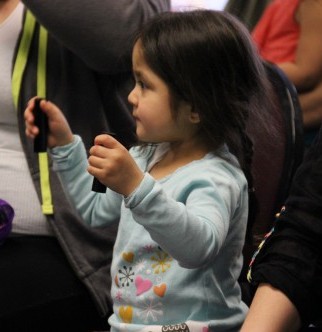
By Andrew Gobin, Tulalip News
Tulalip – Tulalip Youth Services hosts a culture night every Monday at 5:30 p.m. The evening often features lessons on traditional arts and crafts and always includes time for singing and dancing. Some nights, like March 24th, the cultural specialists, Tenika Fryberg and Taylor Henry, prepare an evening of culture and community through games and other presentation. On the 24th, they presented the traditional slehal game.
Slehal, translated as bone game or also referred to as stick game, is a traditional game that is played throughout the Salishan area, from Northern Oregon up to Haida Gwaii and as far east as Browning Montana. The goal is to win all of the stick by finding the unmarked bone, much like the children’s game ‘pick a hand.’ The number of sticks varies between seven and eleven, but the goal remains the same.
Bone Games mean many things for Salish peoples. There are origin stories about men playing against the animals to determine who will rule the world. This embodies two specific aspects of slehal, gambling and dispute settlement. Historically, slehal was a means to settle disputes. Whoever won the game, won the argument. Traditionally, slehal was a gamble, and still is today with many tournaments for prize money up to $10,000 cash.
Culture night is a chance to enjoy these aspects of our culture, coming together as a community to teach all people about our traditions. It is a place to learn the songs and the dances, and, like this week, the communal traditions.
Culture Night is held every Monday in the portable across from the old tribal center, now the youth center, at 6700 Totem Beach Rd. For more information contact Taylor Henry at (360) 716-4916.
Andrew Gobin is a reporter with the See-Yaht-Sub, a publication of the Tulalip Tribes Communications Department.
Email: agobin@tulaliptribes-nsn.gov
Phone: (360) 716.4188
Fire destroys Sunny Shores garage and car on the Tulalip Indian Reservation
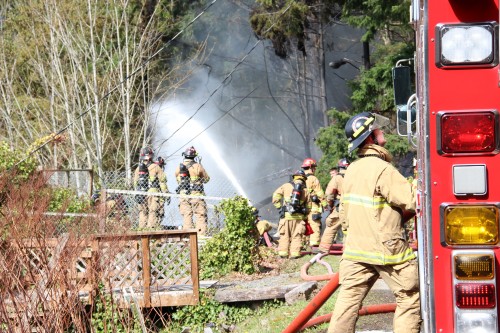
By Andrew Gobin, Tulalip News
Tulalip – Tulalip Bay, Stanwood, Getchell, and North County fire departments responded to a garage fire at Sunny Shores around 12:30 this afternoon. Firecrews arrived to find the structure fully engulfed in flames.
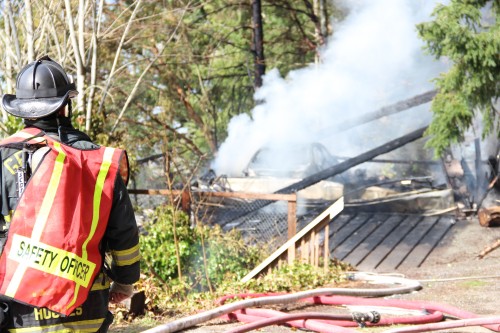
“There was nothing left of the roof, the walls were almost completely gone, the metal door had melted down, and the car was gone,” said Tulalip Bay Fire Chief Teri Dodge.
Water tenders brought water down the one-lane access road, because there are no hydrants in the area. After extinguishing the fire, crews sprayed foam on the scorched remains to prevent accelerants from reigniting the blaze.
Dodge explained, “Garage fires tend to burn very quickly. Once the fire breaches the roof or the walls, the oxygen feeds it. Most garages have accelerants inside as well, which make garage fires that much more devastating.”
In addition to limited access and limited water, there was a downed power line that crews had to work around until Snohomish County PUD was able to cut power to the line.
The garage burned completely to the ground, leaving only the floor and what remained of the vehicle inside.
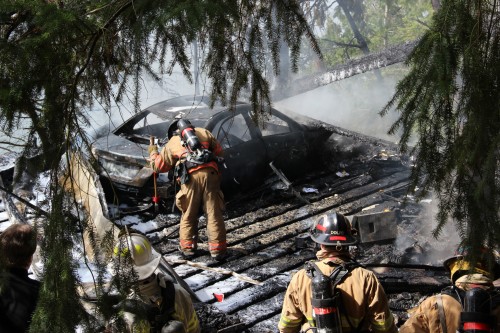
The fire was discovered by homeowner Heidi Atterson who then called 911. Her husband, Steve Atterson, arrived on scene shortly there after. The cause of the fire has yet to be determined, though it is suspected to have began as an electrical fire.
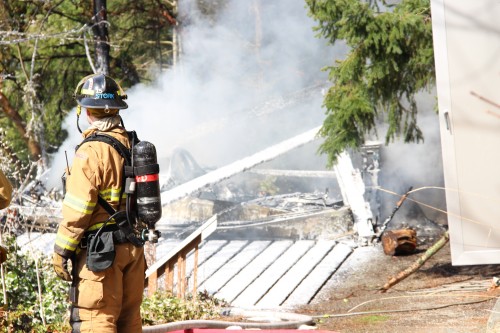
Andrew Gobin is a reporter with the See-Yaht-Sub, a publication of the Tulalip Tribes Communications Department.
Email: agobin@tulaliptribes-nsn.gov
Phone: (360) 716.4188
First-time offenders learn accountability through diversion program run by tribal elders
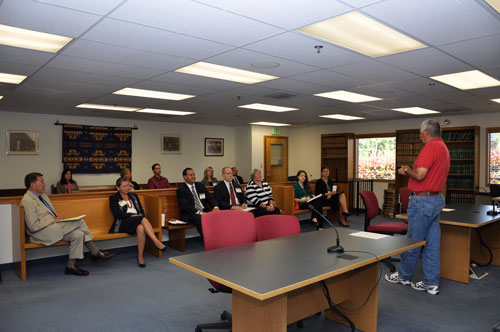
Photo/ Brandi N. Montreuil, Tulalip News
By Brandi N. Montreuil, Tulalip News
TULALIP, WA – The 2012 Annual Tulalip Tribal Court Report states 415 criminal cases were heard in court. Included in that 415, are 24 newly filed criminal alcohol charges and 69 disposed, meaning judicial proceeding have ended or a case that has been resolved. Also counted in that 415, are 76 newly filed criminal drug cases and 126 disposed. Helping to tackle these numbers is a group of volunteer Tulalip elders, who are teaching offenders accountability in a traditional way, and saving the court thousands of dollars.
In it’s sixth year, Tulalip Tribal Court’s Elders Panel is a diversion program that uses traditional Tulalip culture and the wisdom and experiences of Tulalip elders to reach first-time offenders and eliminate re-offending.
The panel meets every two weeks with non-violent first-time offenders, ages 18-42, who have been charged with minor criminal offenses such as possession of alcohol or marijuana, or criminal mischief. Currently the panel consists of Donald Hatch Jr., Lee Topash , Dale Jones, Arthur Hank Williams Sr., Eleanor M. Nielson, and Katherine M. Monger.
Enrollment in the program is voluntary but comes with a large incentive to complete it. Defendants receive deferred prosecutions on their criminal charges for the length of their enrollment in the program, usually a year. Upon successful completion of the program, charges are dismissed. This is the one of the largest incentives a diversion program can offer a first-time offender; it is a chance to rebuild a life.
“If many of these offenders went through the regular process they would be in jail,” said Topash about the opportunity the program provides for participants. “We don’t cut them any slack. The one thing we encounter is attitude, especially with the young folks, they try and get things by us, but they quickly realize what it’s all about.”
The panel requires defendants to actively engage in their community and culture to learn the impact their actions create, not just in their life, but the lives of their family members and community members. Requirements include regular appearances before the panel, writing letters of apology, community service, substance abuse treatment, curfews, UA’s, anger management classes, mental health evaluations, and no new violations. Cultural participation can include family research and traditional spiritual activities.
“Coming here, has been the best thing for me,” said a current client. “If I hadn’t come here I would have lost my kids. I struggled at the beginning and I slacked off. I didn’t take it seriously and didn’t finish all my community service hours and I had to go to jail for a few days. Listening to the girls in jail it made me think about the opportunity I have in this program. I didn’t want to be in there. This program has changed me a lot and I am grateful, because this is the longest that I have been clean and sober in a long time.”
According to court estimates, the panel typically handles 10 cases a year, saving the court an average of $20,000 a year in judicial and probation time, including jail cost, which can run the Tribe $67.92 a day for each incarcerated tribal members, sentenced through Tulalip Tribal Court, and a $97 booking fee.
“There are costs that we cannot measure in terms of costs to society when young offenders are before Elders Panel and follow the sanctions sentenced by Elders Panel, and are not committing any new crimes,” said Tulalip Tribal Court Director, Wendy Church.
“We like to play the role of the grandfather and grandmother because we want to give advice that a grandfather or grandmother would give,” said Hatch about the cultural approach portion of the program.
Many of the positive changes in a defendant’s behavior early on in the process can be attributed to regular meetings. In small communities such as tribal communities, it is not unusual for participants to be familiar with elders on the panel. This eliminates the clinical judicial feel experienced in typical judicial diversion programs. This can be considered the program’s greatest keys to success.
“Indian people traditionally do not have good feelings about court systems,” explained Tulalip chairman, Mel Sheldon Jr. “This program shows the young people that we all make mistakes but here are ways to recover from them.”
Although some offenders will re-offend, Elders Panel sees an 87 percent success rate in participants.
“The loss of this program would be huge in this community,” said Hatch. “We have saved the Tribe close to a million dollars over the past six years. If we were not here a lot of our children would be in the court system and it would increase the cost to the court and to the Tribe. We would also lose all the good work through community service that helps our community, but more importantly we would lose helping our people.”
In 2009, the Tulalip Tribal Court’s Elders Panel was recognized by the Washington State Bar Association (WSBA) for the Local Hero’s Award. The WSBA Board of Governors searches statewide for noteworthy programs that have made substantial contributions to their communities, this recognition is bestowed upon non-lawyers.
For more information about the Elders Panel or to volunteer to be on the panel, please contact Tulalip Tribal Court at 360-716-4773.
Brandi N. Montreuil: 360-913-5402; bmontreuil@tulaliptribes-nsn.gov

